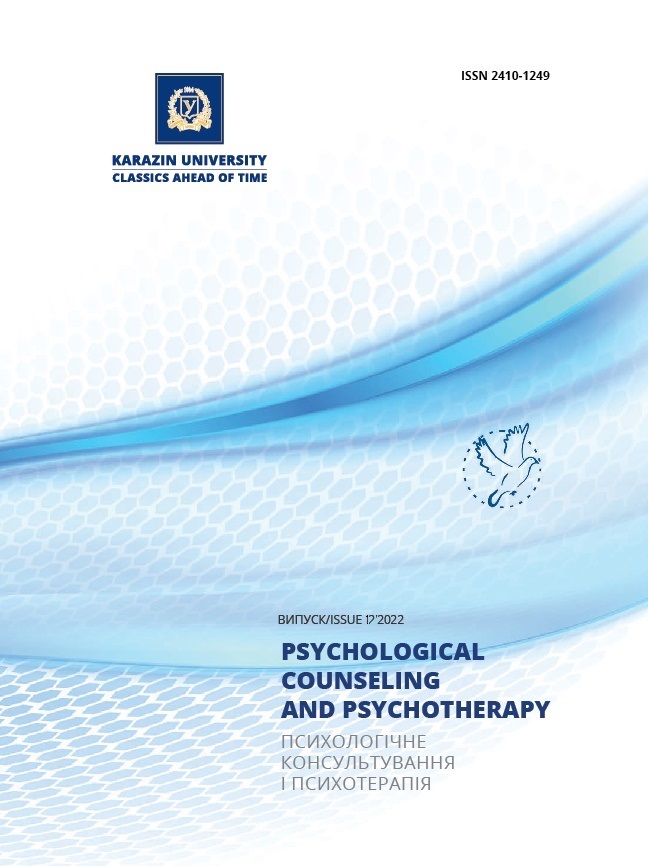Experiential-role approach in psychotherapy
Abstract
The article presents the author's approach to the practice of psychological help, which we call experiential-role psychotherapy. It comes into being as a synthesis of methods of psychodrama, transactional analysis, the theory of systemic family psychology and psychotherapy, and a problem approach to the practice of psychological help based on author’s practical achievements and theoretical models. The essence of the method is the organization of emotional experience and practical experience in a state of role impersonation. The method makes it possible to work with a wide variety of problem topics, situations, relationships. Among them, three directions can be distinguished that determine the specificity of psychotherapeutic interventions. The first direction covers interventions in a state of non-hypnotic age-related regression, using transactional models of redecision and reparenting. Such work allows solving many psychotherapeutic tasks: changing ineffective and destructive scripted beliefs, improving self-relationship, harmonizing relationships with others. The second direction includes interventions focused on experience of physical sensations; their goal is a redecision at the level of the bodily script. This work is aimed at problems related to bodility, including psychosomatic reactions, dysfunctions of individual organs and systems of the body, and even with psychosomatic diseases in the early stages of development. The third direction is interventions within the framework of the family system; here there is a redecision in the state of historical regression at the level of the family-generic script. The work uses the model of the family-ancestral unconscious and is aimed at solving a number of systemic problems related to problematic or traumatic family information, excluded figures, family secrets, etc. Special attention is paid to working with the consequences of collective traumas experienced by a person's relatives and ancestors. In addition to traditional role figures, the work uses specific “age-related”, “bodily” and “historical” roles, that opens up the possibility of successful psychotherapy in working with many problems.
Downloads
References
Alexander, F. (2004). Psychosomatic medicine: its principles and applications. Moscow: Institut obshchegumanitarnykh issledovanii, (In Russian)
Bern, E. (2018). Principles of Group Treatment. Moscow: Akademicheskiy Proekt; Kultura. (In Russian)
Burno, M. E. (2012). Therapy by creative self-expression (national clinical psychotherapeutic method). Moscow: Akademicheskiy Proekt; Alma Mater. (In Russian)
Vasilyuk, F. E. (1984). Psychology of Experience. Analysis of Coping with Critical Situations, Moscow: Publ. MGU. (In Russian)
Vasilyuk, F. E., Karyagina T.D. (2017). Personality and experiencing in the context of experiential psychotherapy. Counseling Psychology and Psychotherapy, 25(3), 11–32. https://doi.org/10.17759/cpp.2017250302. (In Russian)
Gornostai, P. P. (2007). Personality and Role: Role Approach in Social Psychology of Personality. Kiev: Interpress Ltd. (In Russian).
Gornostai, P. P. (2018). Counselling Psychology: Theory and Practice of Problem Approach. Kiev: Nika-Centre. (In Russian)
Groysman, A. L. (1979). Problems of role psychotherapy. Psychological mechanisms of regulation of social behaviour. Moscow: Nauka, pp. 175–203. (In Russian)
Goulding, M., Goulding R. (2001). Changing Lives through Redecision Therapy. Moscow: Nezavisimaya firma “Klass”. (In Russian).
Gendlin, E. (2013). Focusing. Moscow: Eksmo. (In Russian)
Izotova, E. I., Martsinkovskaya T. D. (2016). A problem of experiencing is in conceptions of Vygotsky and Teplov: modern context. Cultural and historical psychology, 12(4), 4–13. https://doi.org/10.17759/chp.2016120401 (In Russian)
Karyagina, T. D. (2015). Experiential approaches in modern psychotherapy. Counseling Psychology and Psychotherapy, 23(1), 126–152. (In Russian)
Kocharian, A. S., Lisennaya A. M. (2011). Psychology of experiences: textbook. Kharkov: Karasin KhSU. (In Russian)
Kocharian, A. S. (1996). Personality and Sex Role (symptom complex of masculinity/femininity in norm and pathology). Kharkov. (In Russian)
Moreno, J. (2008). Psychodrama. Moscow: Aprel-Press, Psihoterapiya. (In Russian)
Potehina, V. E. (2018). The problem of definition the concept “existential experiences”]. Humanitarian Research. 12 [Electronic resource. Retrieved from http://human.snauka.ru/2018/12/25332 (In Russian)
Beiker, K., Varga, A. (eds.). (2015). Family systems theory Murray Bowen: basic concepts, methods and clinical practice]. Moscow: Kogito-Centre. (In Russian)
Frankl, V. (2016). Logotherapy and existential analysis: papers and lectures. Moscow: Alpina Non-fikshn. (In Russian)
Hein, M. A. (2003). Transactional Analysis and Psychodrama: A combination that works well. Psychodrama and Modern Psychotherapy, 1, 36–51. (In Russian)
Hellinger, B. (2013). The orders of love: how love and life succeed together. Moscow: Institute of Counseling and Systemic Decisions. (In Russian)
Schützenberger, A. A. (2009). Terminally ill patients. 15-years experience in application of psychodrama in cancer therapy. [P. Holms, M. Karp. (eds.) Psychodrama : Inspiration and Technique]. (pp. 217–243). Moscow: Nezavisimaya firma “Klass”. (In Russian)
Schützenberger, A. A. (2010). Psychogenealogy: How to heal family wounds and find yourself. Moscow: Psychotherapy. (In Russian)
Abdulla, H. (2019). Transactional Analysis and Psychodrama – Convergence and Divergence. Zeitschrift für Psychodrama und Soziometrie, 18, 91–101. https://doi.org/10.1007/s11620-019-00481-9
Boszormenyi-Nagy, I., Spark, G. V. (1984). Invisible Loyalties: Reciprocity in Intergenerational Family Therapy. New York: Brunner/Mazel, U.S.A.
Carnabucci, K., Anderson, R. (2011). Integrating Psychodrama and Systemic Constellation Work: New Directions in Action Methods, Mind-Body Therapies and Energy Healing. London: Jessica Kingsley Publishers.
Gill, М. М. (1982). Analysis of transference, Vol. 1. Theory and Technique. (Psychological Issues, Monograph 53). New York: International Universities Press.
Goulding, R., Goulding, M. (1976). Injunctions, decisions, and redecisions. Transactional Analysis Journal, 6(1), 41–48.
Holtby, M. E. (1975). TA and Psychodrama. Transactional Analysis Journal, 5(2), 133–136.
Jacobs, A. (1977). Psychodrama and TA. In. M. James. (Ed.) Techniques in transactional analysis for therapists and counselors (pp. 239–249). Reading, MA: Addison-Wesley.
Naar, R. (1977). A psychodramatic intervention with a T.A. framework in individual and group psychotherapy. Group Psychotherapy, Psychodrama & Sociometry, 30, 127–134.
Sokovnina, M., Aleshin, V. (2015). Integration of Psychodrama and Transactional Analysis Methods in psychoeducational work with school-age children in Russia. International Journal of Transactional Analysis Research & Practice, 6(1). https://doi.org/10.29044/v6i1p15
Schiff, J. L. (1969). Reparenting schizophrenics. Transactional Analysis Bulletin, 8(31), 47–63.








